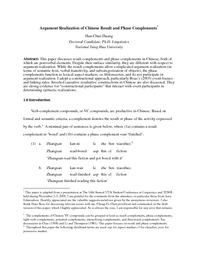
ATTENTION: The works hosted here are being migrated to a new repository that will consolidate resources, improve discoverability, and better show UTA's research impact on the global community. We will update authors as the migration progresses. Please see MavMatrix for more information.
Show simple item record
| dc.contributor.author | Huang, Han-Chun | |
| dc.date.accessioned | 2008-11-21T23:10:01Z | |
| dc.date.available | 2008-11-21T23:10:01Z | |
| dc.date.issued | 2007 | |
| dc.identifier.citation | Huang, Han-Chun. 2007. Argument realization of Chinese result and phase complements. UTA Working Papers in Linguistics 2.67-89. | en_US |
| dc.identifier.uri | http://hdl.handle.net/10106/1197 | |
| dc.description.abstract | This paper discusses result complements and phase complements in Chinese, both of which are postverbal elements. Despite their surface similarity, they are different with respect to argument realization. While the result complements allow complicated argument realization (in terms of semantic host, verbal transitivity, and subcategorization of objects), the phase complements function as lexical aspect markers, or Aktionsarten, and do not participate in argument realization. I adopt a constructional approach, particularly Boas’s (2003) event-frames and linking rules. Inverted causative resultative constructions in Chinese are also discussed. They are strong evidence for “constructional participants” that interact with event participants in determining syntactic realizations. | en_US |
| dc.language.iso | en_US | en_US |
| dc.publisher | Linguistics & TESOL | en_US |
| dc.subject | Linguistics | en_US |
| dc.subject | Mandarin Chinese language | en_US |
| dc.subject | Syntax | en_US |
| dc.subject | Phase complements | en_US |
| dc.subject | Result complements | en_US |
| dc.subject | Inverted causative resultative | en_US |
| dc.title | Argument realization of Chinese result and phase complements | en_US |
| dc.type | Article | en_US |
| dc.type | Working Paper | en_US |
Files in this item
- Name:
- 67-89-huang.pdf
- Size:
- 79.96Kb
- Format:
- PDF
This item appears in the following Collection(s)
Show simple item record


